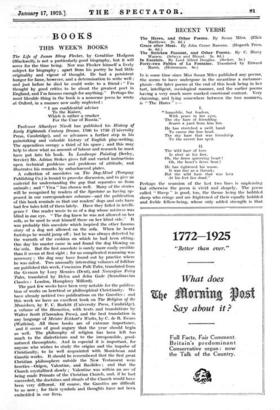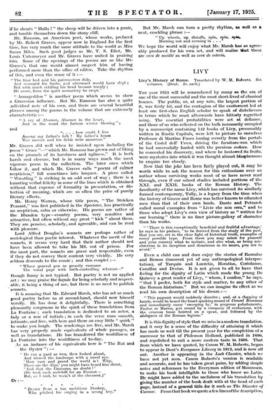RECENT VERSE
The Hares, and Other Poems. By Susan Miles. (Elkin Matthews. 2s. 6d.)
Grace after Meat. By John Crowe Ransom. (Hogarth Prew. 4s. 6d.)
The Stricken Peasant, and Other Poems. By C. Henry Warren. (Selwyn and Blount. 3s. 6d.) In Excelsis. By Lord Alfred Douglas. (Seeker. is.) Forty-two Fables of La Fontaine. Translated by Edward Marsh. (Heinemann. 6e.) Jr is some time since Miss Susan Miles published any poems. She seems to have undergone -in the meantime a metamor- phOsis—the later poems at the end of this book being in her tart, intelligent, sociological manner, and the earlier poems having a very much more marked emotional content. Very charming, and lying somewhere between the two manners, is " The Hares
I.
"Immobile, but fearless, With .peace in her eyes, The shy hare of friendship Scarce a yard from him lies.
He has stretched a swift hand To caress the free head.
The shy hare that was friendship To the covert has sped.
H.
The wild hare of love Is alert at his feet, Oh, the fierce quivering heart !
Oh, the heart's fierce beat 1 He has tightened his noose. It was fine as a thread.; But the wild hare that was love At his feet lies dead."
Perhaps the scansion of the last two lines is unpleasing but otherwise the poem is vivid and shapely. The poem called " Sheep " is good, too, the theme being the hobbled sheep who cringe and are frightened of their equally hobbled and feeble fellow-being, whose only added strength is that
if he shouts " Hullo 1" the sheep will be driven into a panic, and tumble themselves down the stony cliff.
Mr. Ransom, an American poet, whose . works, prefaced by Mr. Robert Graves, appear now in England for the first time, has very much the same attitude to the world as Miss Susan Miles. Such good judges as Mr. T. S. Eliot, Mr.
Louis Untermeyer and Mr. Graves have united in praising him. Some of the openings of the poems are so like Mr.
Graves's that one would almost suspect him of having performed more than the office of editor. Take the rhythm of this, and even the sense of it :—
" The friar had said his paternosters duly,
And scourged his limbs, and afterward would have slept ; But with much riddling his head became unruly ; He arose, from tho quiet monastery he crept."
" Armageddon " is another poem which seems to show a Gravesian influence. Btit Mr. Ransom has also a quite ,ndividual note of his own, and there are several beautiful phrases among the poems in the volume that are extremely characteristic :—
" A cry of Absence, Absence in the heart,
And in the wood the furious winter blowing " ;
and ". . . . how could I live
Among my father's folk ? My father's house Was narrow and his fields were nauseous."
Mr. Graves did well when he insisted upon including the poem " Grace "—" which Mr. Ransom has grown out of liking on the grounds of its harshness and ugliness." It is both harsh and obscure, but is in many ways much the most vigorous poem in the collection. The later ones which follow it, and which Mr. Graves calls "poems of calmer
scepticism," fall sometimes into languor. A piece called " Wrestling " is striking in an odd sort of way ; there is a haunting verbal felicity in sonic of the lines which is obtained without that expense of formality in presentation, or dis- tortion of meaning, which arc so often the price of purely literary effects.
Mr. Henry Warren, whose title poem, " The Stricken Peasant," was first published in the Spectator, has practically
no scepticism, calm or otherwise. His poems are rather of the Bliinder type—country poems, very sensitive and attractive, but often without any great " kick " about them.
They are pensive, scholarly, and agreeable, and can be read with pleasure.
Lord Alfred Douglas's sonnets are perhaps rather of sociological than poetic interest. Whatever the merit of the sonnets, it seems very hard that their author should not have been allowed to take his MS. out of prison. For the most part, the sonnets are grave and respectable, even if they do not convey their content very vividly. He very seldom descends to the comic ; and this couplet :— " Whose general pen so greasily enseams The venal page with birth-controlling schemes—" though funny is not typical. But poetry is not an applied art : we may praise the façade for being scholarly and respect- able, it being a thing of use, but there is no need to publish sonnets.
It is amusing that Mr. Edward Marsh, who has set so much good poetry before us at second-hand, should now himself versify. He has done it delightfully. There is something pleasantly congruous in the spirit of these translations from La Fontaine ; each translation is dedicated to an actor, a lady or a row of initials ; in each the verse runs smooth, intimate, and free, with here and there an easy little " quirk " to make you laugh. The renderings are free, and Mr. Marsh has very properly made equivalents of whole passages, as well as translations. He has transferred the worldliness of La Fontaine into the worldliness of to-day.
As an instance of his equivalents here is " The Rat and the Oyster ": -
" Ho ran a yard or two, then looked about,
And viewed the landscape with a novel eye. How vast and grand the world is ! Why, Those are the Alps,' you might have heard him shout, ' And that the Caucasus, no doubt ! '
(He took each molehill for an Everest—
But, as 1 said, he wasn't of the cleverest.)" .Or . . • " Drawn from a too ambitious Donkey, Who pitched his singing in a wrong key."
But Mr. Marsh can turn a pretty rhythm, as well as a neat, crackling phrase :—
" Up wheels, np distaffs, spin, spin, spin, Morning out and evening in . . .
We hope the world will enjoy what Mr. Marsh has so agree- ably produced for his own set, and will realize that thcEe are viers de societe as well as vers de coterie.











































 Previous page
Previous page